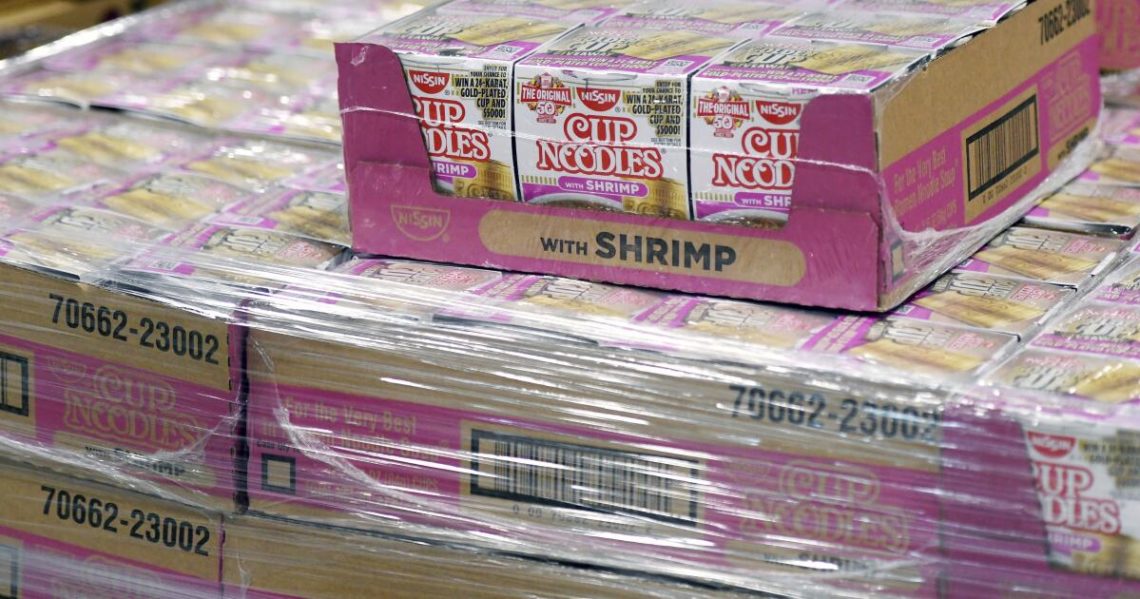Nissin Foods, the Japanese giant that brought the world instant ramen, is testing a new kind of noodle in Los Angeles.
Its sprawling, old factory and corporate office in Gardena is now churning out protein-fortified pastas for Angelenos who want more bang for their bowls.
Nissin invented Cup Noodles, a go-to meal for people across the globe and a favorite among those on a budget. More than 100 billion portions of instant noodles from hundreds of companies are consumed every year.
In the U.S., much of Nissin’s expansion came from Gardena, where it started producing noodle packets in the 1970s. By 1973, the company launched Cup Noodles, an innovation aimed at Americans who liked to drink soup from cups.
The latest American preference Nissin has noticed is a surging demand for protein among mainstream consumers. It is popping up in snack foods, espresso drinks and breakfast cereals. Even Pop-Tarts and Doritos have released products with extra protein.
Nissin launched a new Los Angeles-based noodle company to capitalize on the trend this year. The company, Kanzen Meal, which now has around 10 employees, recently began serving up nutrient-dense meals from the frozen foods aisle. Its products are available in dozens of grocery stores across Southern California.
“There’s an interest in nutrient density and people want more bang for their buck out of the foods that they eat,” Kanzen Meal chief executive Bob Little said. “We think that there’s an opportunity to bring those consumers back to the frozen aisle.”
Kanzen Meal’s shrimp teriyaki, spaghetti Bolognese and other products have up to 24 grams of protein .
Convenience food companies around the world have been struggling with a slowdown in many markets as consumers increasingly avoid highly processed foods. Meanwhile, the spreading use of Ozempic is making it easier for millions of people to control their appetites and be choosier about what they consume.
Amiud this trend, Nissin shares have fallen around 30% over the last 12 months.
Nissin, which opened its facility in Gardena in 1972, recently established a new regional headquarters in Torrance, where Kanzen Meal is based. Many of its attempts to remain relevant start in L.A.
This month Nissin announced its upcoming launch of a “hot water van” that will tour the U.S. and distribute samples of instant noodles. For the holiday season, it has unveiled both turkey and pumpkin pie-flavored Cup Noodles.
With the establishment of Kanzen Meals, Nissin is looking to Los Angeles as the prime testing grounds for its products.
“We’ve got deep ties to the Los Angeles area and we thought that this would be a great market for us to start in,” Little said in an interview. “We recognized early on that Los Angeles is the epicenter of well-being.”
Kanzen Meal products hit shelves in stores such as Gelson’s and Bristol Farms in June. Since then the company has been growing rapidly, Little said. The company announced this month it would expand its distribution to stores on the East Coast in states including New York, Connecticut and North Carolina. It plans to have products in 1,000 stores by the end of the year.
Little attributes the swift growth to a surge in consumer demand for simple access to nutrients, especially in Southern California.
Kanzen will introduce two new frozen products this month, including spicy Dandan noodles and spaghetti carbonara. Each meal contains macronutrients, fats, carbs and fiber and retails for $6.99 to $7.99.
As added protein trends online and in stores, nutritionists are warning consumers to pay attention to all the components in a product. Some with a high dose of protein may also contain large amounts of sugar and sodium, experts said.
“The bigger picture here is that just because something has more protein does not mean it’s healthier for you,” said Yasi Ansari, a Los Angeles-based registered dietitian and nutritionist.
The protein boom actually could lead to American consumers overindulging, Ansari said. The average woman needs around 46 grams of protein to prevent a deficiency, and the average man needs 56 grams, she said.
Protein bars typically contain 20 to 30 grams of protein, and new products such as the Starbucks protein latte can have up to 36 grams.
“Protein is vital to the body’s cells, but we may be missing out on other nutrients that we could be getting from a whole food profile,” Ansari said.
Little said Kanzen Meal’s products offer a healthy balance of ingredients. “Kanzen” means complete in Japanese, he pointed out.
Retail analyst Dominick Miserandino said the demand for protein is creating opportunities for new products, including within the $91.3-billion U.S. frozen food market. But the proliferation of food items advertised as high-protein, ranging from toaster pastries to tortilla chips, could lead consumers astray, Miserandino said.
“It might give a false consumer impression that having these snacks is always a healthy choice,” he said. “Are you going to now have a generation of kids eating snack foods for their daily dose of protein?”
The post Why Japan’s instant ramen titan is testing a new kind of noodle in L.A. appeared first on Los Angeles Times.




